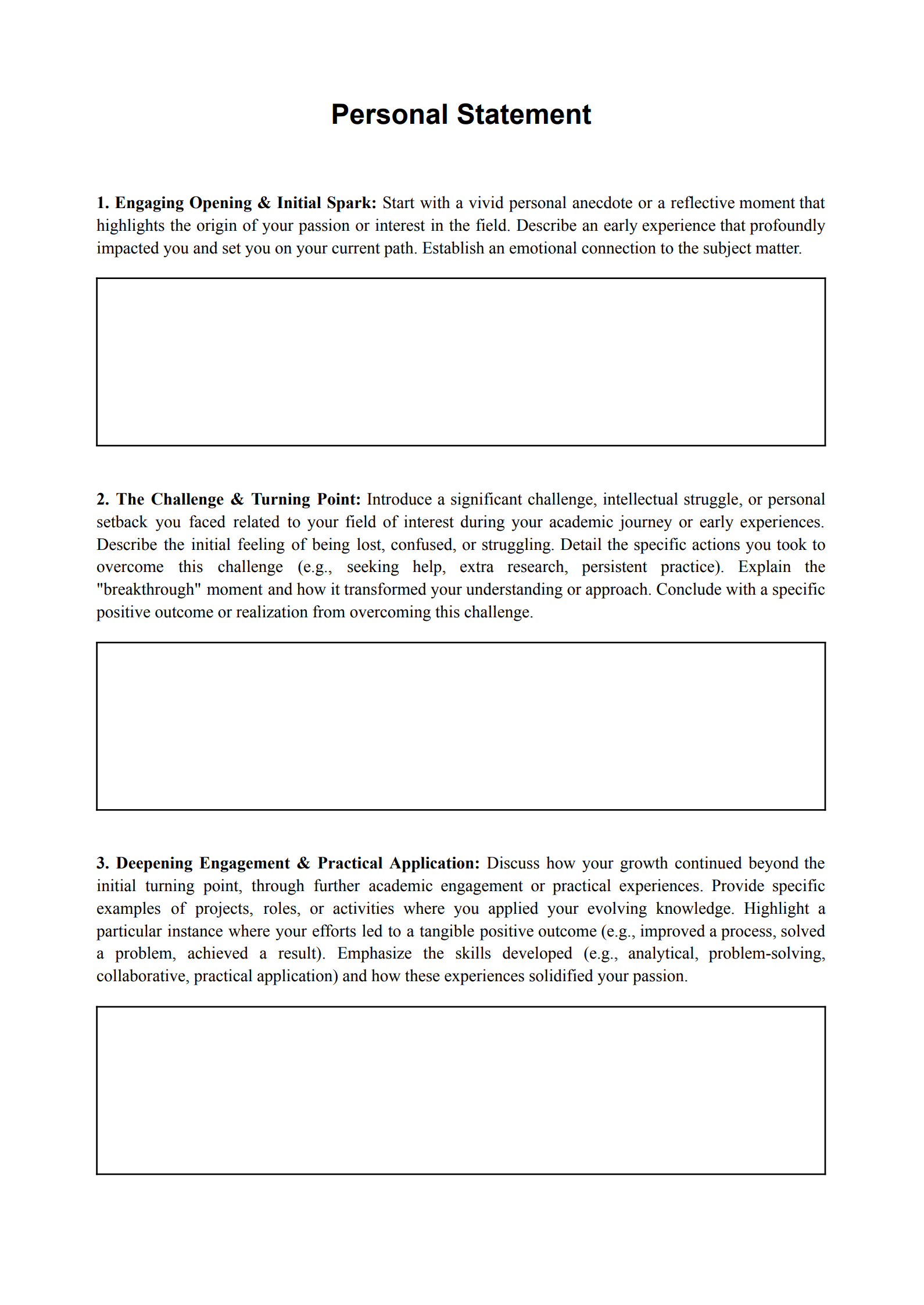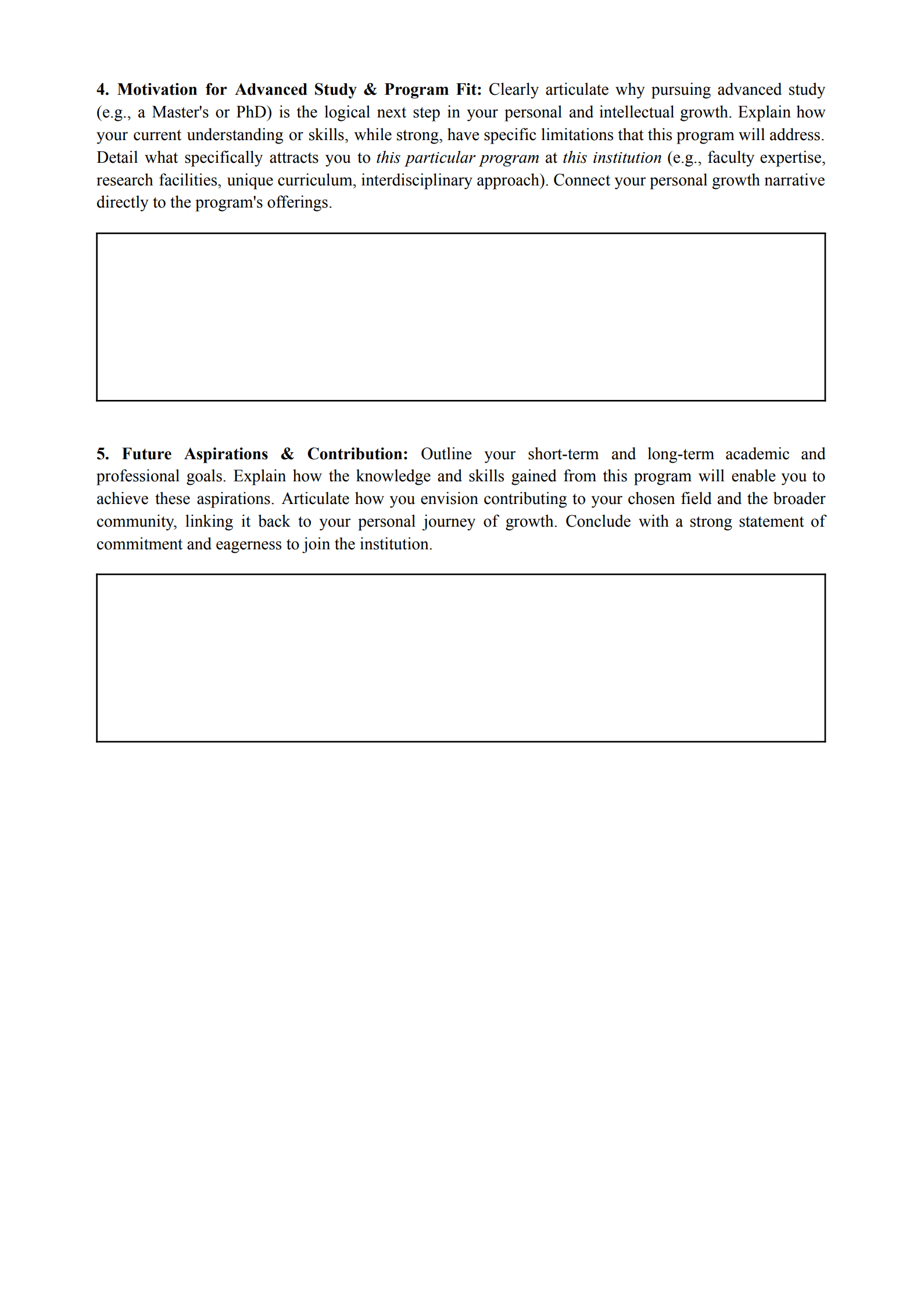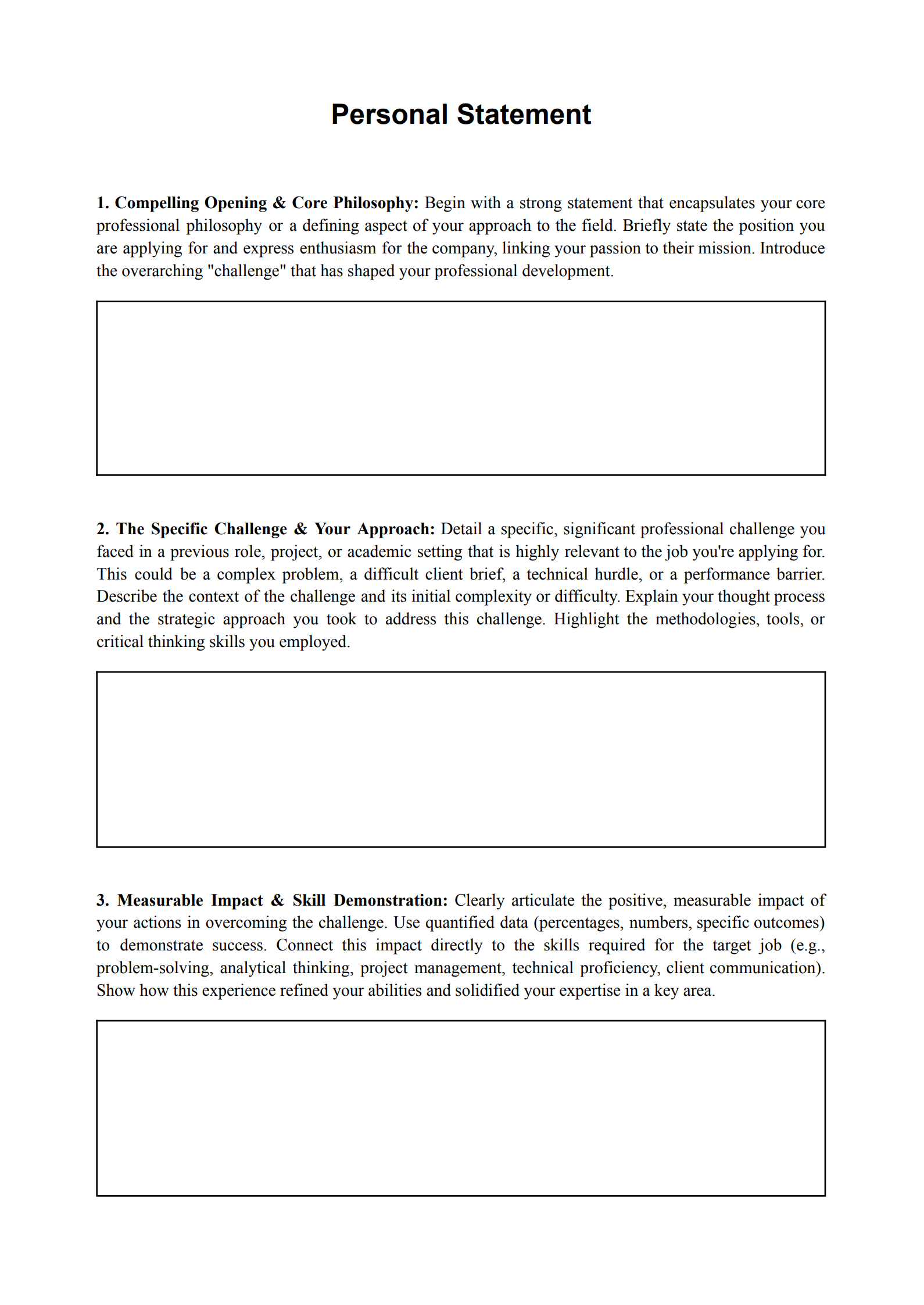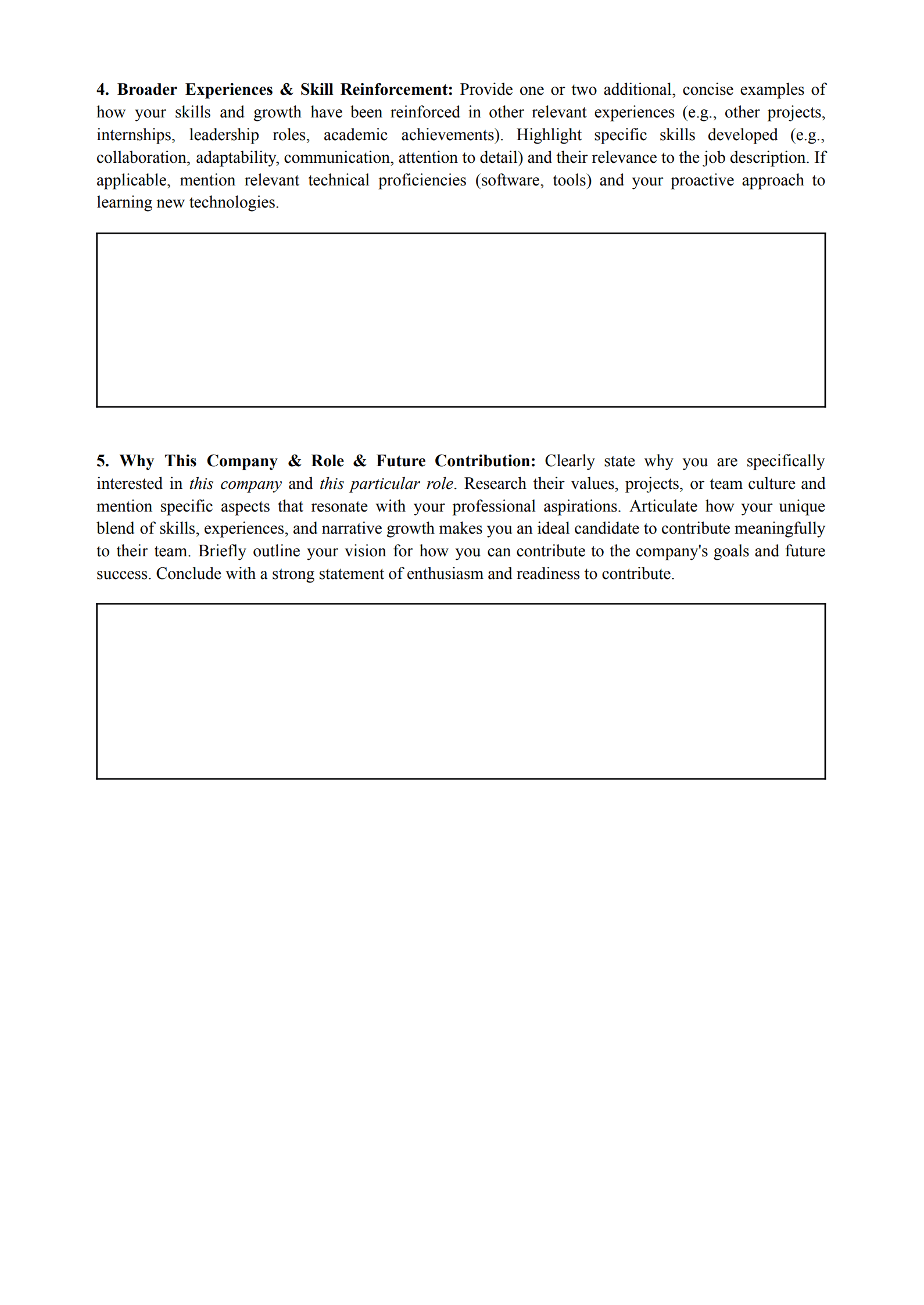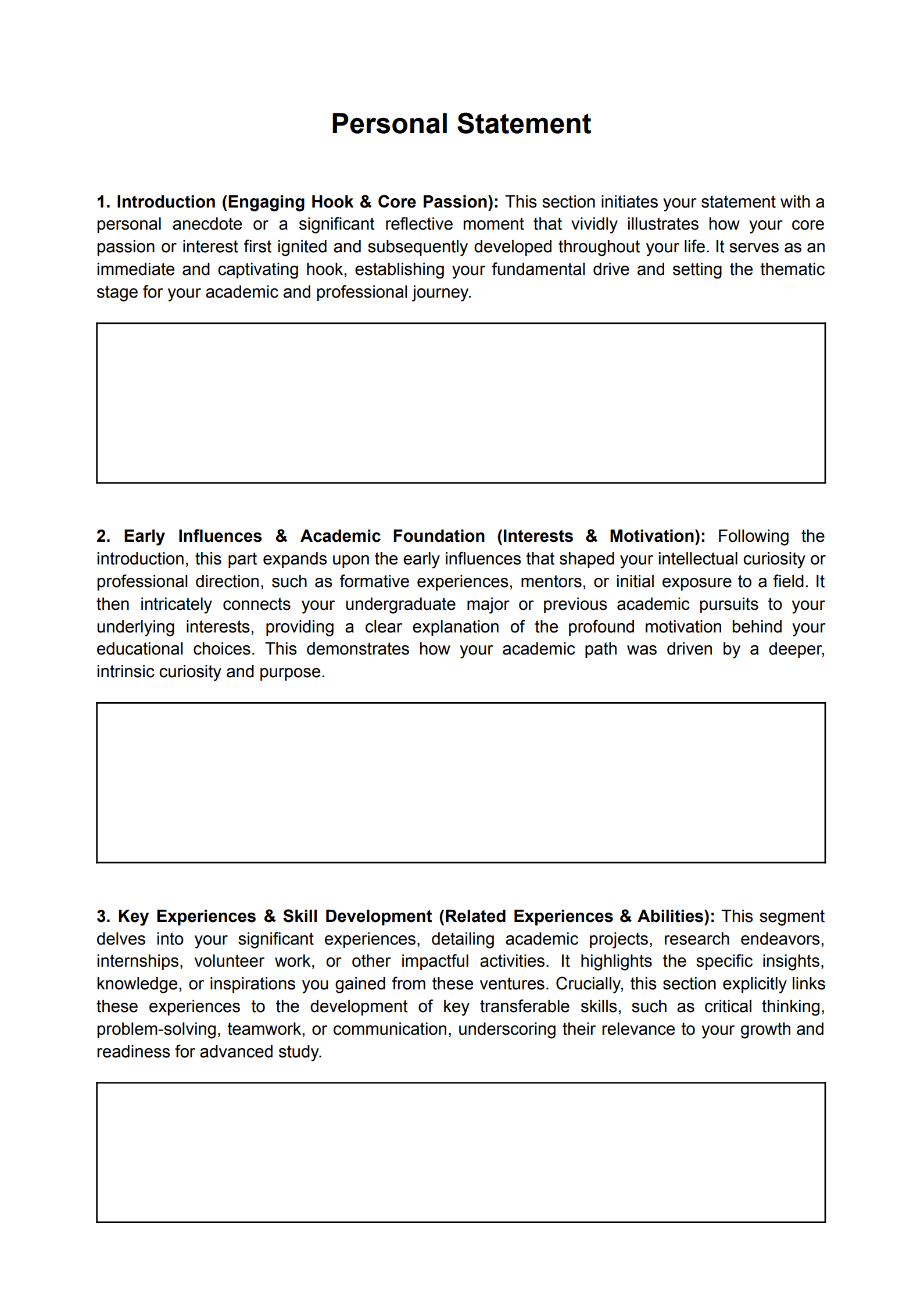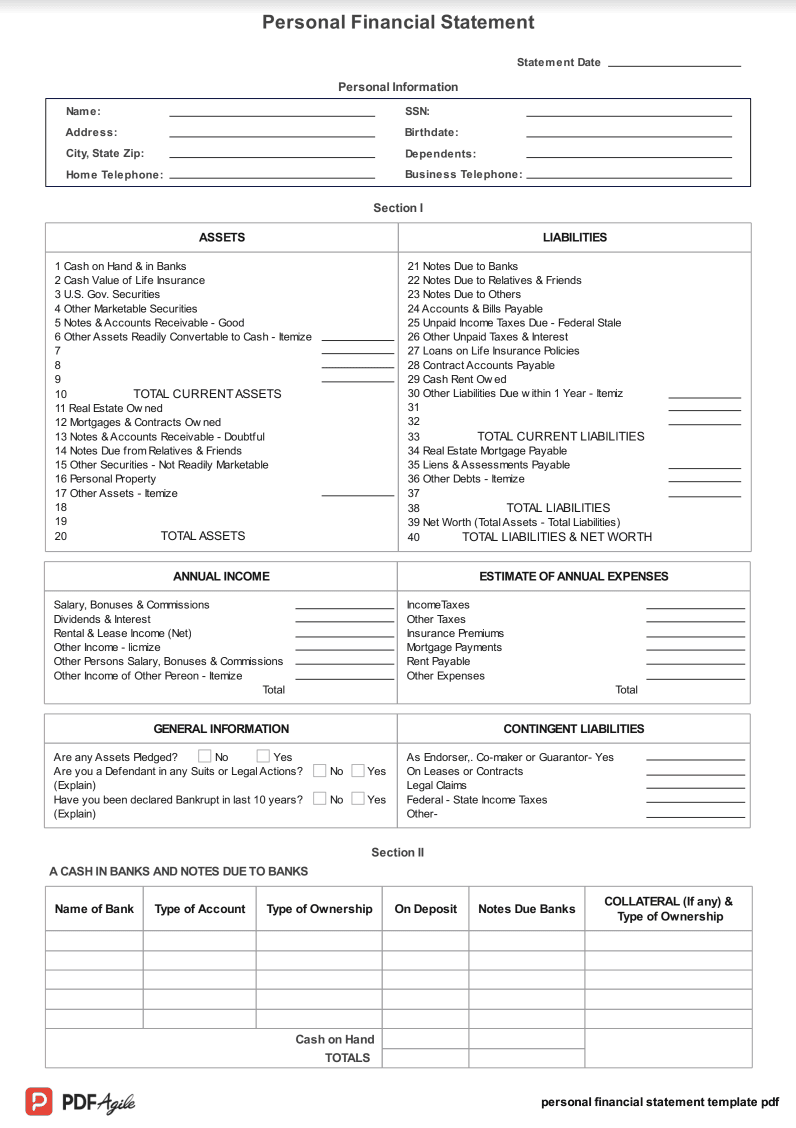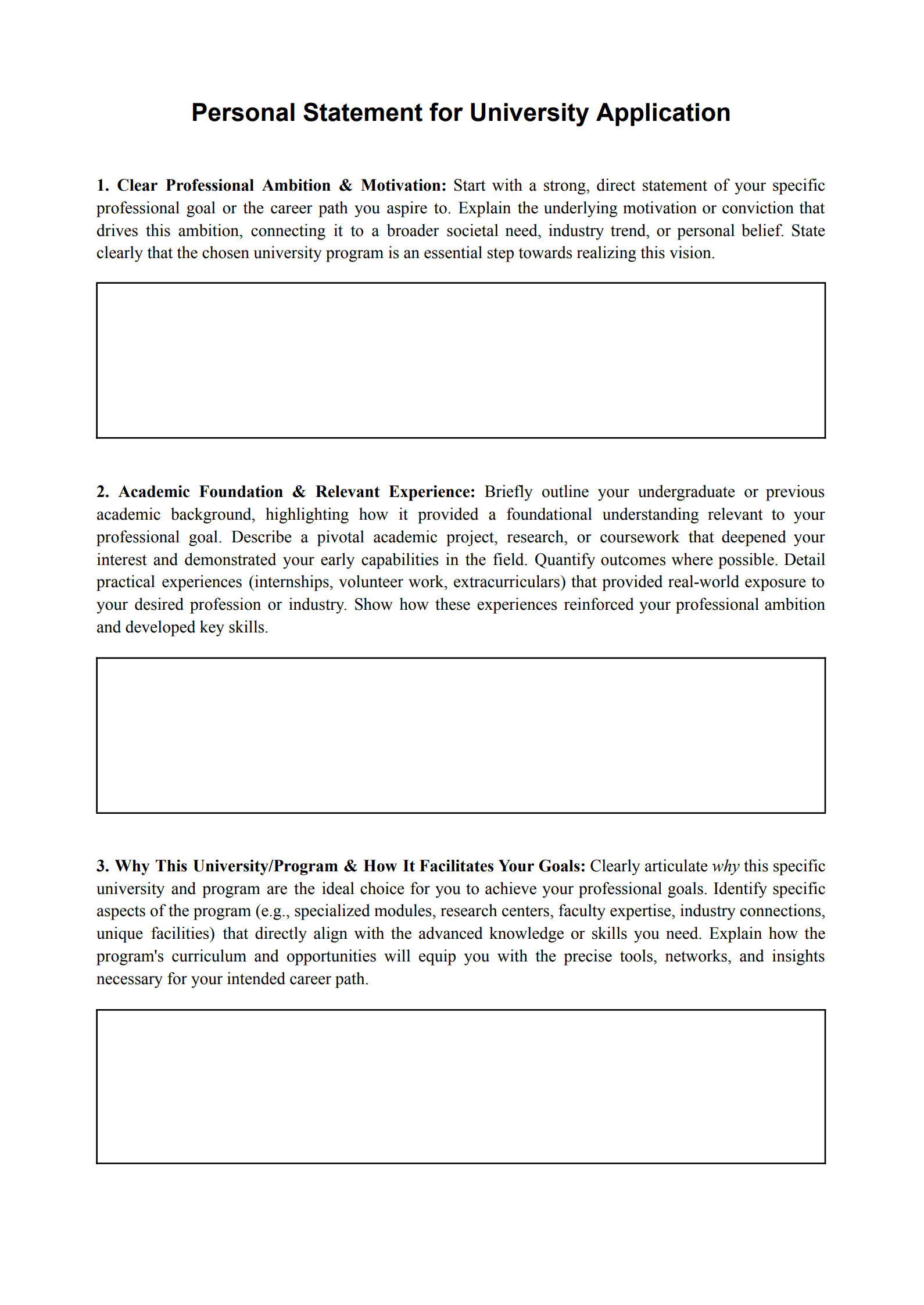In the competitive landscapes of university admissions and job applications, a personal statement is your golden opportunity to stand out. Beyond grades and résumés, it's where your unique voice, motivations, and journey truly come alive. Among the various approaches, the "Narrative Growth" style offers a particularly powerful way to engage your audience, transforming your experiences into a compelling story of evolution and resilience.
What is a Personal Statement Characterized by its Narrative Growth?
A personal statement characterized by "Narrative Growth" is more than just a chronological recounting of events; it's an emotionally engaging journey that emphasizes personal evolution and the overcoming of challenges. This style focuses on how specific experiences, particularly those involving struggle or intellectual hurdles, have shaped your perspective, developed your skills, and solidified your aspirations. It's about demonstrating self-awareness, resilience, and a capacity for learning and adaptation. By weaving a story around your growth, you invite the reader to connect with your journey, making your application memorable and authentic. This approach allows you to showcase not just what you've done, but who you've become as a result.
Real-World Journeys: From Academia to Industry
To illustrate the power of the "Narrative Growth" approach, let's look at two distinct journeys. First, we have Applicant A, whose profound connection to literature led them to pursue a Master's in English Literature. After deepening their academic understanding, they then sought to apply their refined skills in the professional world, aiming for a Book Editor position at a reputable publishing house.
Personal Statement for Master's in English Literature
From the quiet solitude of my childhood bedroom, where dog-eared paperbacks were my most cherished companions, to the vibrant intellectual debates of my undergraduate seminars, stories have always been the compass of my world. I remember vividly the first time a novel truly moved me beyond its plot – a worn copy of Harper Lee’s To Kill a Mockingbird. It wasn't just the narrative of Scout and Jem; it was the subtle power of words to illuminate injustice, to foster empathy, and to challenge preconceived notions. This early encounter wasn't merely entertainment; it was a revelation that literature possessed a profound capacity to shape understanding and inspire change. This realization marked the true beginning of my journey, transforming a simple love for reading into an insatiable curiosity about the mechanics of storytelling and the enduring impact of the written word.
My undergraduate studies in Literature deepened this nascent understanding, but not without their challenges. Initially, I found myself grappling with the dense theoretical frameworks that underpinned literary analysis. Concepts like deconstruction or post-colonial theory felt abstract, threatening to distance me from the very emotional core of the texts I loved. There was a particular essay on Virginia Woolf’s Mrs. Dalloway where I felt utterly lost, unable to reconcile the intricate prose with the critical lens I was expected to apply. This moment of intellectual struggle, however, proved to be a pivotal turning point. Instead of retreating, I immersed myself in supplementary readings, sought extensive guidance from my professors, and engaged in countless peer discussions. This period of intense intellectual wrestling forced me to develop a more rigorous and nuanced approach to textual analysis. I learned to dissect complex arguments, identify subtle narrative techniques, and appreciate the multi-layered meanings embedded within literary works. The breakthrough came when I realized that theory wasn't a barrier to emotion, but a tool to unlock deeper layers of meaning, enriching my appreciation rather than diminishing it. My final paper on Woolf, which explored her use of stream-of-consciousness as a feminist critique of societal expectations, earned me top marks and solidified my confidence in navigating complex literary landscapes.
Beyond the classroom, my growth as a literary enthusiast continued through active engagement. As a contributing writer for the university's literary magazine, The Quill, I experienced the intricate process of shaping raw ideas into polished prose. I learned the importance of conciseness, clarity, and the subtle art of revision. More significantly, serving as a peer editor for The Quill provided my first tangible experience in refining others' work. I recall a particular instance where a talented but verbose writer submitted a compelling short story that was losing its impact due to excessive exposition. Through careful, collaborative feedback, focusing on pacing and evocative language, we managed to trim the piece by nearly 25%, revealing its true emotional power and leading to its publication. This experience was incredibly rewarding, igniting a nascent passion for the transformative power of editorial work.
My decision to pursue a Master's in English Literature is a natural evolution of this deeply personal and intellectual journey. I am now driven by a desire to delve into the advanced theoretical frameworks and critical methodologies that will allow me to engage with literature on an even more sophisticated level. I am particularly drawn to [mention a specific research area, e.g., narrative theory, contemporary fiction, post-structuralism] and believe that [University Name]'s program, with its esteemed faculty such as [mention a specific professor if known] and its rich resources in [mention a specific library collection or research center], offers the ideal environment for this intellectual exploration. I am eager to contribute to a vibrant academic community, to challenge my own perspectives, and to refine my analytical and interpretive skills to an expert level.
Ultimately, my journey with literature has taught me that stories are not just words on a page; they are living entities that reflect, shape, and challenge our understanding of the human condition. I am confident that a Master's in English Literature will not only deepen my intellectual engagement with these narratives but also equip me with the advanced critical thinking and communication skills necessary to contribute meaningfully to the literary world, whether through academic discourse or by nurturing the next generation of compelling voices. I am prepared to dedicate myself fully to the rigorous demands of this program and am excited by the prospect of continuing my growth within your distinguished institution.
Personal Statement for Book Editor
My journey into the world of publishing is rooted in a lifelong fascination with the transformative power of language and story, a passion that evolved from a childhood love of reading into a meticulous dedication to the craft of writing and editing. This evolution was profoundly shaped by a defining challenge during my Master's in English Literature: grappling with the inherent tension between an author's raw creative vision and the need for clarity, precision, and audience engagement. This challenge, far from deterring me, became the crucible in which my editorial philosophy was forged.
During my graduate studies, I undertook a significant independent project involving the critical analysis and structural re-evaluation of a complex academic manuscript submitted by a peer for potential conference presentation. The initial draft, while rich in ideas, suffered from convoluted prose, inconsistent argumentation, and a narrative flow that obscured its core message. This presented a substantial challenge: how to preserve the author's original voice and intellectual depth while making the content accessible and impactful for a broader academic audience. I approached this not just as a proofreading task, but as a deep dive into the manuscript's underlying structure and rhetorical effectiveness. I meticulously outlined its arguments, identified logical gaps, and proposed significant reordering of sections. My feedback focused on enhancing sentence-level clarity, streamlining transitions, and suggesting more evocative language without altering the author's intended meaning. The process was iterative, involving multiple rounds of detailed critiques and collaborative revisions.
The impact of this focused intervention was profound. Through my comprehensive editorial suggestions, the manuscript was not only refined but fundamentally transformed. The author later presented the revised paper, receiving overwhelmingly positive feedback for its clarity and persuasive power, ultimately leading to its acceptance for publication in a peer-reviewed journal. The author specifically credited my editorial guidance for helping them articulate their complex research with unprecedented precision, stating that my input was "instrumental in unlocking the true potential of the work." This experience solidified my belief that effective editing is a collaborative art form, a partnership that elevates a manuscript from good to exceptional. It demonstrated my ability to dissect complex texts, identify core issues, and implement strategic solutions that enhance both readability and impact.
Beyond this, my practical experience as a peer editor for my university's literary magazine, The Quill, further honed my skills in refining diverse genres, from poetry to short fiction. I recall working on a particularly poignant short story that was initially diluted by excessive descriptive passages. Through careful, empathetic suggestions, we collaboratively reduced the word count by approximately 25%, allowing the emotional core of the narrative to shine through with greater intensity, leading to its successful publication and positive reader feedback. My internship at [mention a relevant, if fictional, small press or literary agency] further exposed me to the commercial realities of publishing, including manuscript evaluation, author liaison, and understanding market trends. I assisted in reviewing over 50 manuscript submissions, providing initial assessments of their literary merit and commercial viability, which sharpened my eye for promising new voices.
My passion for nurturing compelling narratives, combined with my rigorous academic training in literary analysis and proven editorial capabilities, makes me an ideal candidate for the Book Editor position at [Publishing House Name]. I am particularly drawn to your reputation for [mention something specific about the publishing house, e.g., "championing diverse voices," "excellence in literary fiction," "innovative non-fiction"]. I am eager to apply my meticulous attention to detail, my deep understanding of narrative structure, and my collaborative approach to help authors realize the full potential of their work, ensuring that every book published resonates powerfully with its intended audience.
Our second example, Applicant B, was driven by a lifelong passion for competitive athletics. This passion evolved into a rigorous academic pursuit, culminating in a Master's in Sports Science. Following their advanced studies, Applicant B transitioned into the professional realm, aspiring to become an Athletic Performance Coach, dedicated to optimizing human potential through scientific principles.
Personal Statement for Master's in Sports Science
The rhythmic thud of my running shoes on the track, the burning sensation in my lungs, and the sheer exhilaration of pushing physical limits – these were the defining sensations of my youth. From a young age, competitive athletics wasn't just a pastime; it was a crucible for self-discovery. I remember vividly a particularly frustrating season during high school track, where despite relentless training, my 800-meter times plateaued. It wasn't an injury, but a persistent feeling of hitting an invisible wall. This personal challenge sparked a profound curiosity: what exactly was happening inside my body? What were the scientific principles that governed performance, recovery, and adaptation? This question transformed my relationship with sport, shifting it from mere participation to an earnest quest for understanding, marking the true beginning of my journey into sports science.
My undergraduate studies in Sports Science provided the initial answers, but also presented new intellectual hurdles. I found myself initially overwhelmed by the sheer volume of physiological and biomechanical data, struggling to connect complex cellular processes to macroscopic athletic performance. There was a specific module on exercise physiology where the intricacies of energy systems and oxygen kinetics felt abstract, threatening to overshadow the practical application I so craved. This moment of intellectual struggle, however, proved to be a pivotal turning point. Instead of being intimidated, I embraced the challenge, spending countless hours in the lab, analyzing data sets, and seeking extensive clarification from my professors. I engaged in supplementary readings, devoured research papers, and participated in every available practical session. This period of intense intellectual wrestling forced me to develop a more rigorous and nuanced approach to scientific inquiry. I learned to dissect complex physiological models, identify key variables, and appreciate the interconnectedness of various bodily systems. The breakthrough came when I realized that understanding the molecular details wasn't just academic; it was the key to unlocking true performance optimization, enriching my practical understanding rather than diminishing it. My final research project, which investigated the impact of specific recovery protocols on muscle fatigue markers, earned me top marks and solidified my confidence in applying scientific principles to athletic contexts.
Beyond the classroom, my growth as a sports scientist continued through active engagement. As a student assistant in the university's human performance lab, I gained hands-on experience with advanced physiological testing equipment, from VO2 max analysis to force plate dynamometry. I learned the importance of meticulous data collection and precise experimental design. More significantly, volunteering as an assistant coach for a local youth football team provided my first tangible experience in applying scientific principles in a real-world setting. I recall a particular instance where the team struggled with recurring hamstring injuries. Through careful observation and a basic understanding of biomechanics, I suggested incorporating specific dynamic warm-up drills and eccentric strengthening exercises. This small intervention, based on scientific principles, led to a noticeable reduction in hamstring strains by over 30% over the season, significantly improving team availability and performance. This experience was incredibly rewarding, igniting a nascent passion for translating scientific knowledge into tangible athletic improvements.
My decision to pursue a Master's in Sports Science is a natural evolution of this deeply personal and intellectual journey. I am now driven by a desire to delve into the advanced theoretical frameworks and cutting-edge research methodologies that will allow me to engage with human performance on an even more sophisticated level. I am particularly drawn to [mention a specific research area, e.g., advanced strength and conditioning, sports nutrition, biomechanics of injury prevention] and believe that [University Name]'s program, with its esteemed faculty such as [mention a specific professor if known], its state-of-the-art facilities like [mention a specific lab or center], and its strong links to elite sports organizations, offers the ideal environment for this intellectual exploration. I am eager to contribute to a vibrant academic community, to challenge my own perspectives, and to refine my analytical and practical skills to an expert level.
Ultimately, my journey with sports science has taught me that athletic potential is not just about innate talent; it is about the intelligent application of scientific principles to nurture, optimize, and protect the human body. I am confident that a Master's in Sports Science will not only deepen my intellectual engagement with these principles but also equip me with the advanced critical thinking and practical skills necessary to contribute meaningfully to the field of athletic performance, whether through research or by directly empowering athletes to achieve their peak. I am prepared to dedicate myself fully to the rigorous demands of this program and am excited by the prospect of continuing my growth within your distinguished institution.
Personal Statement for Athletic Performance Coach
My journey into athletic performance coaching is rooted in a profound personal connection to sport and a relentless curiosity about human potential, a passion that evolved from my own experiences as an athlete into a dedicated pursuit of scientific optimization. This evolution was profoundly shaped by a defining challenge during my Master's in Sports Science: bridging the gap between cutting-edge physiological research and its practical, impactful application in real-world athletic environments. This challenge, far from deterring me, became the crucible in which my coaching philosophy was forged.
During my graduate studies, I undertook a significant applied research project with a collegiate track and field team that was struggling with persistent hamstring injuries among its sprinters, leading to significant athlete downtime and compromised team performance. This presented a substantial challenge: how to identify the root causes of these recurring injuries and implement a scientifically sound intervention that would not only reduce injury incidence but also enhance overall sprint performance. I approached this not just as a data analysis task, but as a holistic investigation into training loads, biomechanics, and recovery protocols. I meticulously analyzed individual athlete training logs, conducted biomechanical assessments using force plates and high-speed cameras, and reviewed existing literature on hamstring injury prevention. Based on this comprehensive data, I designed a targeted intervention program that included specific eccentric hamstring strengthening exercises, individualized warm-up routines, and optimized recovery strategies.
The impact of this focused, evidence-based intervention was profound. Over a single competitive season, the team experienced a remarkable 45% reduction in non-contact hamstring injuries among the sprinters compared to the previous two seasons. Furthermore, the athletes participating in the program collectively achieved an average 3% improvement in their 100-meter sprint times by the end of the season, demonstrating that injury prevention could directly translate into enhanced performance. The head coach specifically credited my program for improving athlete availability and contributing to the team's improved overall standing, stating that my scientific approach was "transformative for our sprinters' health and speed." This experience solidified my belief that effective coaching is a blend of scientific rigor, empathetic understanding, and strategic program design, a partnership that empowers athletes to overcome barriers and achieve their peak.
Beyond this, my practical experience as an assistant coach for a local youth football team further honed my ability to apply foundational sports science principles in a dynamic group setting. I recall implementing a periodized strength and conditioning program that, over a six-month cycle, resulted in an average 10% increase in vertical jump height and a 15% improvement in agility scores for the participating athletes. My role as a student assistant in the university's human performance lab provided hands-on expertise with advanced physiological testing equipment, where I conducted over 100 individual athlete assessments, meticulously collecting and interpreting data to inform personalized training recommendations. These experiences have equipped me with a keen eye for performance bottlenecks, a data-driven approach to program design, and the ability to communicate complex scientific concepts in an actionable way to athletes and fellow coaches.
My passion for optimizing human performance, combined with my rigorous academic training in sports science and proven coaching capabilities, makes me an ideal candidate for the Athletic Performance Coach position at [Professional Sports Team/Academy Name]. I am particularly drawn to your reputation for [mention something specific about the team/academy, e.g., "holistic athlete development," "innovative training methodologies," "commitment to cutting-edge research"]. I am eager to apply my expertise in advanced physiological principles, biomechanical analysis, and strategic program design to help your athletes achieve their full potential, minimize injury risk, and contribute to sustained success. I am committed to fostering a culture of excellence and continuous improvement within your performance team.
Why Did Applicant A's Statements Work?
Let's dissect why Applicant A's personal statements, crafted in the "Narrative Growth" style, were particularly effective for both university and job applications.
For the University Application (Story-Driven Immersive):
Applicant A's university personal statement for a Master's in English Literature was a masterclass in the "Story-Driven Immersive" style. It began with an emotionally resonant hook, recalling a childhood fascination with books and a specific, transformative encounter with To Kill a Mockingbird. This immediately established a deep, personal connection to literature, drawing the reader into their world.
The statement then bravely introduced an intellectual challenge: grappling with complex literary theories during undergraduate studies, specifically a moment of being "utterly lost" with Virginia Woolf. This vulnerability made the narrative relatable and authentic. Crucially, it didn't dwell on the struggle but meticulously detailed the proactive steps taken to overcome it—immersing in supplementary readings, seeking professor guidance, and engaging in peer discussions. The "breakthrough" moment, realizing theory as a tool for deeper meaning, showcased intellectual resilience and growth. The positive outcome, a top-graded paper on Woolf, provided concrete evidence of this evolution.
Furthermore, the statement highlighted practical engagement beyond academics, such as contributing to and peer-editing for the university's literary magazine, The Quill. The specific example of refining a verbose short story, where collaborative feedback led to a 25% reduction in length and successful publication, vividly demonstrated nascent editorial skills and a passion for shaping narratives. This blend of personal reflection, intellectual challenge, and practical application created a holistic and compelling argument for their suitability for a Master's program, emphasizing their journey of growth as a literary scholar.
For the Job Application (Narrative Challenge-Impact):
Applicant A's job application personal statement for a Book Editor position at a publishing house effectively transitioned to the "Narrative Challenge-Impact" style. It opened by framing their journey around the inherent tension between an author's creative vision and the need for editorial clarity, directly linking to the core function of an editor.
The statement then presented a significant challenge from their Master's program: structurally re-evaluating a complex academic manuscript. Instead of merely stating they could edit, they detailed the process of overcoming this challenge—meticulously outlining arguments, identifying logical gaps, and proposing significant reordering. This demonstrated a deep understanding of editorial work beyond surface-level corrections. The impact was clearly articulated and quantified: the manuscript was "fundamentally transformed," leading to its acceptance for publication in a peer-reviewed journal, with the author specifically crediting their "instrumental" guidance. This powerful example showcased their ability to dissect complex texts, provide strategic solutions, and achieve measurable results.
Additional experiences, like peer-editing for The Quill, were then presented with a specific, quantified impact (e.g., 25% word count reduction for a short story, enhancing its emotional core). An internship at a fictional small press further demonstrated exposure to commercial publishing realities, including reviewing over 50 manuscript submissions, which sharpened their eye for promising voices. The statement concluded by explicitly connecting these demonstrated skills—meticulous attention to detail, understanding of narrative structure, and collaborative approach—to the specific requirements and values of the target publishing house, proving their readiness to contribute directly to their mission.
Conclusion
The "Narrative Growth" approach to personal statements, as exemplified by Applicant A and Applicant B, offers a powerful framework for showcasing your unique journey. It moves beyond a simple list of achievements, inviting the reader to understand your motivations, witness your resilience, and appreciate the depth of your personal and professional evolution.
Whether you're applying for a university program or a job, our comprehensive personal statement templates provide a step-by-step guide to help you craft your own compelling narrative. Each template is designed to walk you through the process, ensuring you highlight your growth, overcome challenges, and articulate your aspirations with clarity and impact. Explore our range of templates to find the perfect fit for your story and unlock your full application potential.
Free Download: Your Customizable Personal Statement Templates
Need a quick and easy way to create professional Personal Statement Templates? Download our free, customizable templates by clicking the Use Template button on this page. Simply add your specific information and print them out.


